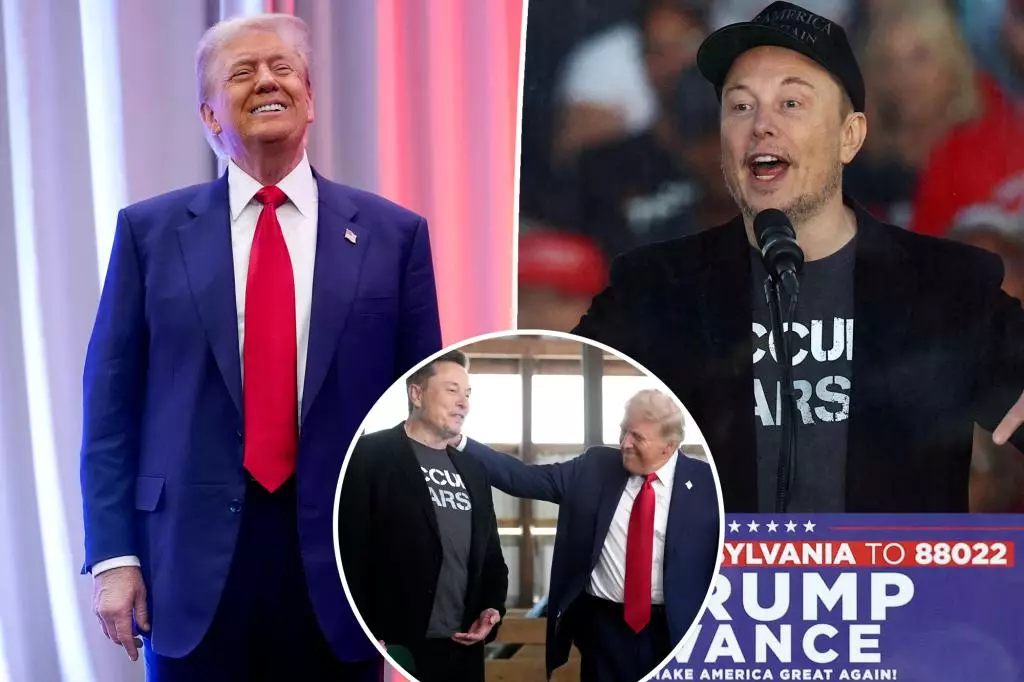In the whirlwind of political intrigue and shifting alliances in the United States, the unfolding relationship between billionaire entrepreneur Elon Musk and President-elect Donald Trump has drawn a surprising amount of attention. Musk, known for his revolutionary work with companies like Tesla and SpaceX, is not just a tech titan; he seems to be carving out a significant place in the political arena as well. However, this newfound closeness has not been without its share of controversy and discontent among Trump’s traditional allies.
Reports indicate that Musk has been a regular fixture at Mar-a-Lago, the opulent resort owned by Trump in Palm Beach, Florida. His involvement seemingly goes beyond mere social visits; it includes participation in serious discussions with influential international leaders, such as Turkish President Recep Tayyip Erdogan and Ukrainian President Volodymyr Zelensky. The presence of Musk in these high-stakes conversations is striking not just because of his business acumen but also due to the potential influence he could wield on U.S. foreign policy.
Sources within Trump’s circle have expressed discomfort over this burgeoning partnership, suggesting that many of the president-elect’s traditional advisors are feeling sidelined. Some insiders report that Trump is slowly but surely narrowing his circle, favoring Musk’s insights and companionship over long-standing associates. This shift could result in significant changes in the dynamics of Trump’s inner circle and possibly impact his decision-making process.
The celebrity of Musk, formerly a distant icon for many Americans, now appears to bring a competitive element to Trump’s inner circle. The envy and resentment simmering beneath the surface hint at the complexities of interpersonal relationships within the Trump administration. It paints a picture of a leader who enjoys creating rivalries, including among his close allies. The message is clear: loyalty may no longer guarantee a spot by Trump’s side; it appears that influence and strategic value are becoming the currency of choice.
As this dynamic unfolds, observers note that this isn’t merely personal—it may be strategic. Trump reportedly believes that Musk played a pivotal role in securing votes from younger demographics, labeling him the “First Buddy.” This camaraderie gives Musk a unique status within the political discourse, allowing him to flex some muscle while adeptly sidestepping official roles that could invite backlash or controversy.
Recently, the announcement of Musk’s leadership role in a new “Department of Government Efficiency” (DOGE) fuels speculation regarding the merger of business and politics in this administration. This initiative, in collaboration with Vivek Ramaswamy, could serve as a forum for exploring cutting-edge concepts aimed at streamlining governmental functionality. Should Musk’s vision come to fruition, it would certainly make waves within Washington’s often chaotic bureaucracy.
While political advantages are a potential outcome, the focus on efficiency and innovation aligns with Musk’s brand, suggesting that this alliance could yield positive results for American governance. His reputation for fostering groundbreaking ideas and impactful systems is well-recorded; thus, his efforts in public service might elevate the discourse around governmental effectiveness.
Interestingly, amid the tension and speculation, a nurturing friendship appears to be blossoming between Melania Trump and Musk. Sources reveal that the future First Lady holds Musk in high regard, potentially providing a stabilizing influence within the often fractious environment surrounding Trump. While Melania’s support might not dramatically change political landscapes, her approval signifies an important aspect of the social fabric of Trump’s administration.
Moreover, incidents like Musk’s appearance in a family photo on election night symbolize the deeper ties forming within this unusual alliance. Trump’s candid remarks about Musk indicate a light-hearted yet critical assessment of their relationship; they hint at a pragmatic willingness to embrace collaboration, at least while it continues to bear fruit.
In hindsight, as we witness the formation of this unconventional alliance, it raises questions about the intersection of business and political efficacy in American governance. With figures like Musk entering the realm of politics, the traditional boundaries may begin to blur, potentially redefining power structures and collaboration among influential individuals. The shifting dynamics in this partnership will be a significant storyline to monitor in the coming months, as America continues to grapple with its evolving identity, ideologies, and aspirations.

